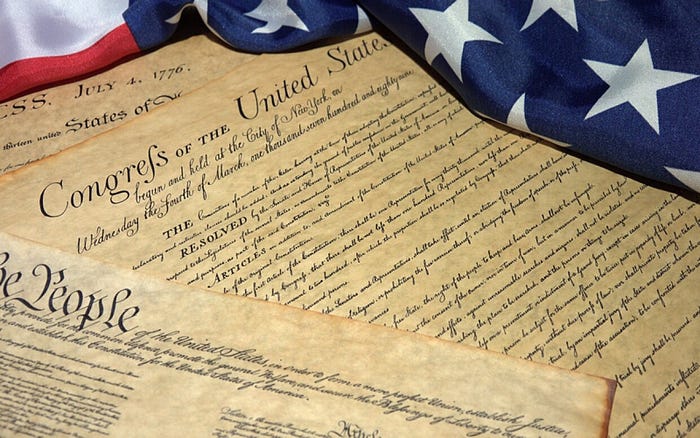What is the Definition of Liberty?

The United States (U.S.) is a democratic republic whose government is a structural paradox that challenges our belief in liberty, the people, and our representatives. The contradiction begins with the fundamental questions posed based on two key assumptions by the greatest political philosophers throughout the centuries dating back to the Roman Empire, including the writers of the U.S. Constitution. The first debatable assumption is whether people are naturally altruistic towards society or, are people naturally selfish and only interested in pursuing their own ambition and agenda. The second point of tension is if there should be parameters on the exercise of liberty or, are limitations an infringement on liberty.
How do you balance freedom and liberty in a society where some believe in complete liberty and others believe in restrained liberty? Who decides the parameters of liberty and what are the intentions of those making the decisions…are they for the advancement of society or the destruction of government?
Let’s start with the difficulty of defining liberty. This question is explored by the great French political philosopher Montesquieu in “The Spirit of Laws” published in 1748. Now before you roll your eyes, the writers of the U.S. Constitution were very influenced by this publication and its impact resonates today. Montesquieu states that for a government to exist, it must pursue “the love of virtue” meaning that members of government must have the willingness to put the interests of the community ahead of any private interests. Without this fundamental foundation, he posits that governments will fail.
Montesquieu questions what is the definition of liberty. It is a very complex answer that creates friction and faction found today in our democratic republic government (a hybrid of direct government by the people and representational governing). He explains there are significant differences in what liberty means to people and how it is applied. Does liberty mean to be free of tyrannical rule, the right to bear arms to impose violence on others, or to be governed by agreed upon laws? Are people able to act individually and free of restriction or are they subject to governmental restrictions with their liberty? Montesquieu explains this is the difference between independence and liberty, where liberty is constrained under laws that apply to all citizens.
English philosopher John Locke (who greatly influenced our founders) defined liberty in 1689 to mean “Persons have a right or liberty to (1) follow their own will in all things that the law has not prohibited and (2) not be subject to the inconstant, uncertain, unknown, and arbitrary wills of others.” This can be interpreted that liberty is subject to governmental restrictions if they are consistent and universally applied to all citizens.
The U.S. has a troubled past on its definition of liberty. The Declaration of Independence, written in 1776, states everyone has a natural right to “life, liberty, and the pursuit of happiness” but everybody was not inclusive of the enslaved or Blacks, or women who were denied the right to vote until 1920. Even after women were given the right to vote, Black women in the South along with Black men were denied the right or prevented from voting until the 1960s and still face systemic obstacles today.
Depending on one’s political leanings, the definition of liberty can range from social equality to total economic and individual freedom. Some people see government as the source of liberty and others see it as the antithesis of liberty. This wide spectrum of opinions is where political and social tensions form in our society. This friction and faction of defining liberty is based on individual beliefs of what (if any) laws should be made and if they support liberty or restrain liberty.
Should integration be required, or should people have the choice attend school with those they choose? Should abortions be banned, or should women have the right to control their bodies? What history should be taught in school, and should government make that determination? Is sexuality an individual liberty or is it subject to legal restrictions? Is owning any type of weapon an individual right or should government legislate restrictions for the freedom of everyone to live safely?
Living in a democratic republic is messy. Italian philosopher Machiavelli believed that generally, man will pursue whatever is in his individual best interest and not those of society. He views society as made of two types of people, those who desire to control and oppress and those who wish not to be controlled and oppressed. This contrasts with Montesquieu’s belief that government can only stand if virtue of man and society are one. On the other hand, Machiavelli believes that democracies or republics only progress when there is political tension and conflict between people thereby reflecting a true democracy.
Many may conclude that one cannot be classified as only virtuous or self-motivated and that this internal and external conflict between altruism and self-interest exists in all people. This is the conclusion of the Federalists (Madison and Hamilton) who believed a representational government was the only way to represent all of the people by maintaining a formal structure to establish laws and governance. But what happens when the representatives do not live up to their entrusted duties and assumed moral character? Madison and Hamilton shared Machiavelli’s fear of the possibility that representatives with personal ambitions could compromise the needs of the people for their own good.
In Hamilton’s First Federalist paper, he addresses the threat to the U.S. republic from “the perverted ambition of another class of men, who will either hope to aggrandize themselves by the confusions of their country or will flatter themselves with fairer prospects of elevation.” Hamilton and Madison believed that man is flawed but still, a democratic republic was the best form of government for the new nation.
In Federalist Paper 51, Madison states, “In framing a government which is to be administered by men over men, the great difficulty lies in this: you must first enable the government to control the governed; and in the next place oblige it to control itself.” In response to Machiavelli’s belief that faction and friction must exist in a true democracy, Madison concurs that taking away liberty to control this tension is a cure worse than the illness. A republic was viewed by the founders as the best governing solution over a pure democracy where all of the people must reach an impossible consensus across opinions and social positions for self-government.
You may be wondering what does all of this history mean to America today? Freedom, liberty, and democracy will always be in conflict. Many people believe things are politically worse today than any previous time in our history. We must remember that America had a revolution with the British over taxation without representation in Parliament, in addition to concerns with the control by the monarchy and religious freedom. We had a Constitutional Convention with Federalists and anti-Federalists debating the type of government, the rules of government, and checks and balances on the power of government. We had a Civil War over the Constitutional right to liberty for the enslaved. We added Constitutional amendments to guarantee the rights of all citizens regardless of gender or race and they are challenged routinely through the Supreme Court. There are people who believe our nation should return to the ways at the founding and others who believe our Constitution must be living and progressing into the modern era. Some believe government must take care of all of the people and others believe government should allow the people to take care of themselves.
For better or worse, as Machiavelli, Madison, and Hamilton foresaw, we are a nation of flawed humans and independent thinkers. This is what freedom affords its citizens. However, Hamilton and Madison, along with the other writers of the Constitution, believed that government with checks and balances is a necessity to ensure freedom for all.
It is upon each of us to engage politically by understanding who represents us, voting for worthy representatives and ballot questions, protesting what we view as a violation of our freedom for the good of the people, and assuring political office holders are held responsible for their position and power. We should not tolerate people who put personal ambition over the people, do not respect the laws of the land, and who openly reject the Constitution’s defined role for government. Democracy is a fragile environment that can only be protected by the voice of the people and the adherence to the law. It takes all of us to engage and utilize our personal liberty keep our democracy alive and well.
References
Hamilton, Alexander; Madison, James; Jay, John (1901). Smith, Goldwin (ed.). The Federalist (PDF). New York: The Colonial Press.
Locke, Two Treatises on Government: A Translation into Modern English, ISR, 2009.
Montesquieu: The Spirit of the Laws, trans. Anne M. Cohler, Basia Carolyn Miller, and Harold Samuel Stone. Cambridge Texts in the History of Political Thought. Cambridge: Cambridge UP, 1989.
